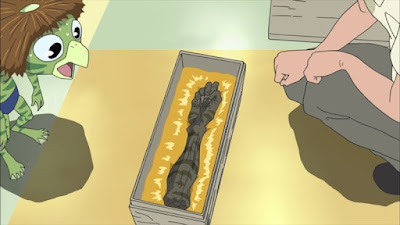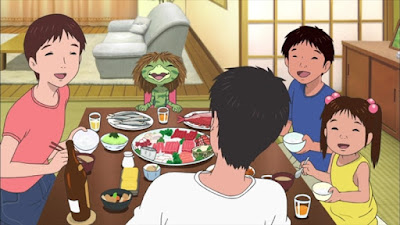(2007) Written and directed by Keiichi Hara; Story by Yuichi
Watanabe and Masao Kogure; Based on the stories "Kappa Daisawagi" and
"Kappa’s Surprise Journey," by Masao Kogure; Starring: Kazato Tomizawa,
Takahiro Yokokawa, Naoki Tanaka, Naomi Nishida, Tamaki Matsumoto and Natsuki
Uematsu
Available on Blu-ray and DVD
Rating: ****
“For anime, the topic of family… That topic is not very appropriate for anime, that’s what many people think. But I’m more interested in that than in fantasy or science fiction. I want to depict the family, human beings, human drama (ningen drama).”
– Keiichi Hara (from 2011 interview with Nippon Connection
TV)
Many thanks to Gill of Realweegiemidget Reviews and Rebecca of Taking Up Room for hosting the Home Sweet Home Blogathon, focusing on all things related to home and family. Be sure to check out all the excellent contributions. Today’s selection focuses on a rather unique addition to one family…
Anyone who follows this blog probably already knows about my fondness for everything yokai (mythical creatures that reside throughout Japan). There have been many depictions of yokai in Japanese popular culture over the centuries, but perhaps none have appeared as extensively as the elusive water sprite known as kappa.*/** Descriptions vary somewhat, but some constant features include a bipedal, vaguely human shape, with a beaklike mouth, a dish on top of their head (which must continually remain wet for the creature to keep its strength up), and a turtle shell on their back. Some notable depictions in film include 1968’s Big Monster War (aka: Yôkai Daisensô) and its 2005 remake, The Great Yokai War (aka: Yôkai Daisensô), along with the more adult-oriented, Underwater Love (2011). Writer/director Keiichi Hara’s fantasy family drama Summer Days with Coo, was based on two stories by children’s author Masao Kogure.
Kôichi Uehara is an ordinary
grade-school boy whose life take an extraordinary turn when he finds an unusual
stone by a river that runs through his neighborhood. Trapped inside the large
rock is a shriveled, almost reptilian creature. After taking his prize home, he
runs the stone underwater to clean it off, inadvertently reviving the creature.
Kôichi names him “Coo,” after the first sound he makes. Kôichi’s parents soon conclude
that the creature is a young kappa,* and the family members conspire to keep the
kappa secret from the outside world. But a secret this big can only be kept so
long. Much to their dismay, Coo becomes a reluctant star, creating a media circus
around the Uehara household.
Fun Fact #3: Summer Days with Coo is like a class in Kappa 101, delving into many aspects of these fascinating yokai, including a fondness for sumo-style wrestling, eating cucumbers, and their flatulent nature (yes, it’s a kappa thing).
At its core, the film illustrates how everyone fits into the family unit, no matter how disparate the separate elements might seem. One of the more surprising things (at least for anyone accustomed to more formulaic fare) is how readily the parents accept the surprise addition. In most lesser stories there would be contrived friction between the family members, but they are truly a team when they meet adversity. Among the most believable aspect is the initial resistance from Kôichi’s little sister Hitomi. Unlike the rest of her family, she takes an instant dislike to Coo, viewing him as an interloper who’s only there to steal her thunder. Her animosity comes to a head when Coo is given her old baby chair to sit at the dinner table, which looks an awful lot (at least to a preschooler) like replacement. When Coo finally does win her over, it’s a hard-fought battle, with a small but meaningful gesture of kindness. The family dog Ossan (meaning “Old Man”),* completes the family, fitting into the greater scheme of things, guiding Coo with wisdom from his world-weary canine perspective.
* One caveat: The brief flashback scene concerning Ossan’s former abusive owner was difficult for me to watch, and I suspect many may find this disturbing. Although the scene provides context for Ossan’s worldview, it seems to downplay the behavior of the abuser, which might warrant further discussion if watching with more impressionable family members.
Our emotions are earned rather than manipulated, because we gradually get to know the characters on their own terms. As he’s introduced to us, Kôichi isn’t especially likable, but as we spend more time with him, we get to understand his perspective, and come to like him as his character experiences growth. For more than half the film’s duration, Kôichi is aloof with fellow classmate Sayoko, keeping her at arm’s length, but they have more in common than he initially realizes. Both are loners, introspective and sensitive. Sayoko seems to understand Coo more than he does. It takes him a while to catch on that they’re two of a kind, and that Coo, himself, is a loner. His fellow kappa have vanished, and he’s lost in a world where his kind are regarded as myth.
Summer Days with Coo is all about contrasts, including cruelty versus kindness, life versus death, and selfishness versus selflessness. The kindness of Kôichi’s parents is contrasted with the cruelty of the boys that mercilessly taunt Kôichi and Sayoko. Eventually, Kôichi finds a way to confront the bullies’ ringleader, recalling Coo’s admonition (during one of their wrestling matches) that “Strength alone isn’t good.” The film proves repeatedly how Coo’s inherent distrust in humanity instilled by his father is well-founded. In the opening scene, set hundreds of years ago in the Edo period, he witnesses his father’s murder at the hands of a paranoid samurai. When he appears on a television program, an historian (a direct descendent of the samurai) displays his father’s severed arm as a treasured heirloom, which only serves to reinforce Coo’s trauma of witnessing his father’s unwarranted death. The historian’s denial that the arm has any connection with Coo’s past is a grim reminder that history is told by the victors, rather than the vanquished. Another recurring theme is life out of balance. Recalling words his father once told him, Coo observes how humans have taken the natural world from the kappa, “…But in return they lose their souls.” Coo fears losing his way in the world and his identity.
Director Keiichi Hara has created something truly special with Summer Days with Coo, tugging at our heartstrings without resorting to saccharine levels of sentimentality. His film reminds us the world may be cruel at times, but there are wondrous things as well. Unlike some popular (particularly American) animated films aimed at families, it doesn’t sugarcoat the more unsavory aspects of life, presenting serious topics in a frank manner. At a length of 138 minutes, it takes its time allowing us to know the characters, but doesn’t waste a moment. It’s time well spent, as we become invested in the Uehara family and Coo. Summer Days with Coo stresses the importance of unconditional love, preserving our traditions, and gratitude to those who have shown us kindness, but above all, being true to yourself.
Sources for this article: Yokai Attack! The Japanese Monster Survival Guide, by Hiroko Yoda and Matt Alt; 2011 Keiichi Hara interview with Nippon Connection TV; “On the Hunt for Tono's Mythical Water Trolls,” by Louise George Kittaka, The Japan Times, July 26, 2014








Thanks for this lovely introduction to this genre, this looks a lovely film with a proper chance to know this family at over 2 hours running time. Thanks for joining and bringing Coo with you.
ReplyDeleteYou're welcome, Gill. I'm so glad I decided to make a last-minute change, and go with this one. I can't recommend this enough! Thank you so much for hosting another terrific blogathon!
DeleteA modern day fairy tale. We could use more of these. I learned something today. I must say I did not know of the yokai, but they seem like very nice creatures. Thank you!
ReplyDeleteThere are definitely some yokai you wouldn't want to mess with, but I'd love to meet a kappa someday. Thanks for visiting! :)
DeleteNice review, Barry.
ReplyDeleteThis sounds like a very thoughtful and thought-provoking film.
As you know, I'm not really into anime, but I may have to keep this one in mind.
Thanks, John! It's well worth your time. It's a bittersweet, deeply affecting experience. Something you wouldn't expect from a "kids" film.
DeleteThis animation looks like so much fun! I definitely want to see it! I love what you say here: "it doesn’t sugarcoat the more unsavory aspects of life, presenting serious topics in a frank manner". I wish more animations did that. Life can be bitter-sweet and even in the hardest moments, there are glimpses of hope. I feel like Japanese animations handle this much better than Disney or Pixar.
ReplyDeleteAgreed! It's unflinching at times, but it also has its moments of gentle humor and beauty. Highly recommended, and it's available to watch for free through Kanopy and Hoopla, if you have access to those services. Thanks for stopping by! :)
DeleteAs usual, a masterful analysis of a film. I am completely unaware of this one and will put it on my list to be seen. Thank you for the head's up.
ReplyDeleteThank you very much! :) I was planning to review something else, but this one really spoke to me. I hope you enjoy it.
DeleteBeing a fan of cryptozoology and folktales and myths, the yokai sound like they would be right up my alley. But, I know very little about them. As I continue to expand my anime experiences, it sounds like I should give Summer Days with Coo a watch. Thanks for a great review (as always).
ReplyDeleteThanks, Michael! Yokai are everywhere in Japanese fantasy fiction, so once you see 'em you can't miss 'em. Pom Poko is another great introduction to the weird and wild world of yokai. Highly recommended.
DeleteThis sounds like an engrossing movie with good messages about repaying kindness, etc. I hadn't heard of it before, so thanks for the heads up. :)
ReplyDeleteThis truly is! It would be a good movie for discussion afterwards. And it's also a nice introduction to the world of yokai. Thanks so much for visiting!
DeleteThanks for the "twofer" recommendation: I've now got Summer Days on my watch list, and Yokai Attack! on my reading list! The best anime are full of authentic, bittersweet moments that cause you to reflect after you've shed a tear or had a good laugh. The Japanese have such a rich folkloric tradition to draw from, resulting in deeply imaginative and humane films.
ReplyDeleteYou're welcome, Brian! This is such a bittersweet but rewarding movie that earns its emotions from the viewer. Yokai Attack! is a deceptively thin volume that provides a perfect primer to Yokai. Once you read about some of the various types, and the rich social/historical perspective behind them, you'll start spotting yokai everywhere! Enjoy!
DeleteWow, this looks so good--I'm going to have to check it out. I like that it seems to let the characters breathe and do what they want. That's good storytelling. Thanks again for joining the blogathon, Barry--this was great!
ReplyDeleteThanks again for the invite, Rebecca! It was wonderful finding a new favorite, and fun writing about it. Cheers! :)
DeleteFinally i had a chance to watch this anime, it was a hell of a heart-warming journey ibenjoyed it so much
ReplyDeleteSame as the first time i came across it i thought, why is it so underrated ? And tobthis day it remained the same.
Kappa no Kû to Natsuyasumi needs to shine more
I agree with you 100%. Such a wonderful anime film. Thanks for visiting!
Delete